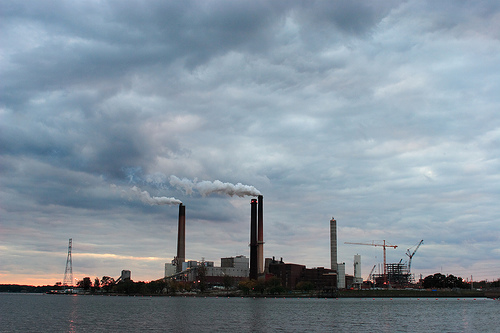| « Can Obama say NO to the Omnibus Bill ? | Socialized Medicine is on the way, or is it? » |
"Cap and Trade" your life away...

Cap and Trade is designed to offset the evil carbon emissions. There are a few things about Cap and Trade that just don't click.
http://www.washingtonpost.com/wp-dyn/content/article/2007/04/08/AR2007040800758_pf.html
As U.S. lawmakers work on the details of their greenhouse-gas legislation, they are looking carefully at Europe's experience. Five Senate proposals all use the same basic approach, known as "cap and trade," that Europe has used for the past two years. But what the snappy name "cap and trade" means is that the market will put a price on something that's always been free: the right of a factory to emit carbon gases. That could affect the cost of everything from windowpanes to airline tickets to electricity.
I have to correct Steven Mufson, the author of the article I quoted. The market IS NOT going to put a price on something that has always been free; the government WILL.
I thought that this was going to save the planet. But after all, who is going to say, "we can't afford to save the planet". Well perhaps that's what people should be saying. Let's assume for a minute that "Man Made Global Warming" is a real issue, and that reducing carbon emissions will fix the problem. Never mind that 10 years ago it was all about carbon monoxide...
Consider the plight of Kollo Holding's factory in the Netherlands, which makes silicon carbide, a material used as an industrial abrasive and lining for high-temperature furnaces and kilns. Its managers like to think of their plant as an ecological standout: They use waste gases to generate energy and have installed the latest pollution-control equipment.
But Europe's program has driven electricity prices so high that the facility routinely shuts down for part of the day to save money on power. Although demand for its products is strong, the plant has laid off 40 of its 130 employees and trimmed production. Two customers have turned to cheaper imports from China, which is not covered by Europe's costly regulations.
"It's crazy," said Kusters, the plant director, as he stood among steaming black mounds of petroleum coke and sand in northern Holland. "We not only have the most energy-efficient plant in the world but also the most environmentally friendly."
Of all the effects of the new rules, the rise in the price of power has aroused the most outrage. Much of the anger of consumers and industries has been aimed at the continent's utility companies. Like other firms, the utilities were given slightly fewer allowances than they needed. But instead of charging customers for the cost of buying allowances to cover the shortfall, utilities in much of Europe charged customers for 100 percent of the tradable allowances they were given -- even though the government handed them out free. Electricity rates soared.
The chief executive of one utility, Vattenfall, which owns a coal plant that is one of the continent's biggest carbon emitters, defended the decision. Lars G. Josefsson, who is also an adviser to German Chancellor Angela Merkel, said higher electricity prices are "the intent of the whole exercise. . . . If there were no effects, why should you have a cap-and-trade system?"
Germany boasts that it has cut emissions to 18.4 percent below 1990 levels, the benchmark used in the Kyoto Protocol and in Europe. But nearly half the reduction was because of sagging industrial output in the former East Germany after reunification. For the 2008-2012 period, E.U. officials sliced 5 percent off Germany's emissions proposal.
The system is designed to tax energy usage to encourage less energy use. But as the article states, there was no bonus for being efficient in the government's eyes. Why then would this encourage anyone to update their systems?
Look at it this way. The system will be enacted retroactively, the power plants are already built and running. Some plants are going to be more efficient than others. The newer more efficient plants are in the green, so to speak, because they are newer. The older plants are not going to fair as well on the carbon scale. So let's increase taxes on the businesses we just told to upgrade! How is that going to encourage anything. The power companies that have to offset their emissions are going to be at an immediate disadvantage, because they are going to loose money instantly.
If the community relying on the, now higher taxed companies, can support the price increase; then that will be the end of it. Because after all, how many power companies are "in competition"? This is absurd. It's not like a car where you can pick a different one if you like. This just passes the cost to the end user, who has no direct control over what goes on. What are you going to do, not pay your power bill in protest?
If the government is really worried about the environment, then why don't they offer tax reductions NOW to companies which upgrade their systems. Why impose a new tax, then offer incentives to decrease it, especially when the economy is in a downturn.
Obama to The San Francisco Chronicle last year [2008]:
"So if somebody wants to build a coal-powered plant, they can; it’s just that it will bankrupt them because they’re going to be charged a huge sum for all that greenhouse gas that’s being emitted."
This can't be misunderstood. Obama is saying outright that they want to destroy part of the energy sector. Not only that, they want to destroy part of the energy sector -- before there is an alternative. This is not wise.
Please leave a comment, like it or hate it, I'm looking for conversation... You DO NOT need to register to leave a comment. Email addresses are NOT used. Just make one up "someone@somehost.com"